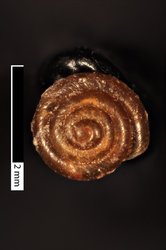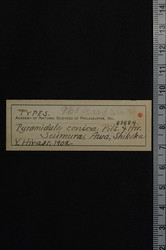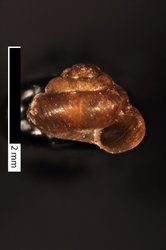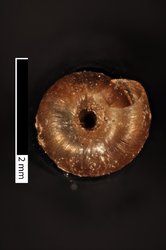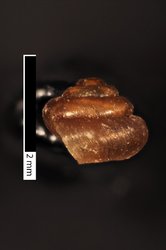< Back to Search Results
New Search >
lectotype + paralectotypes Pyramidula conica
ANSP Malacology Collection Specimen Search Details
ANSP 83884Pyramidulidae
Pyramidulidae lectotype + paralectotypes Pyramidula conica
Dry Catalog # 83884
Count 6
Catalog date Oct 1902
donor Hirase, Y.
donation date
provenance Hirase, Y.
Count 6
Catalog date Oct 1902
donor Hirase, Y.
donation date
provenance Hirase, Y.
Alcohol Catalog #
Count
Catalog date
Preservative
Prefixative
Fixative
Postfixative
Count
Catalog date
Preservative
Prefixative
Fixative
Postfixative
ecology
unnamed locality
specific locality Suii-cho
secondary division Anan-shi
primary division Tokushima Prefecture, Shikoku
country Japan
original locality Suimura awa Shikoku, Japan [eledger]; Suimura, Awa, Shikoku [original description]
Coordinates
source of coordinates
unnamed locality
specific locality Suii-cho
secondary division Anan-shi
primary division Tokushima Prefecture, Shikoku
country Japan
original locality Suimura awa Shikoku, Japan [eledger]; Suimura, Awa, Shikoku [original description]
Coordinates
source of coordinates
expedition
vessel
station
collector
date collected
collecting gear
site size
slope
aspect
altitude
depth
pH
salinity
surface temp.
bottom temp.
sediment
associated taxa
vessel
station
collector
date collected
collecting gear
site size
slope
aspect
altitude
depth
pH
salinity
surface temp.
bottom temp.
sediment
associated taxa
Remarks
ANSP 83884
remarks The shell Baker separated as the lectotype was recombined with the other shells in the lot. All shells are similar in size and there is no way to distinguish which shell Baker choose; therefore, the lectotype is âlostâ within the lot. ASL 29 Mar 2013. Ledger states âdate of presentationâ for ANSP 83877-83920 is âJan 6 1903â, but this is incorrect as some numbers in this range had been published by November 1902.
Citations
ANSP 83884
Pilsbry & Hirase, 1902. Nautilus 16: 77, not figured
Pilsbry, 1935. Manual of Conchology (Ser. 2) 28 (112): 187, pl. 23 figs. 3, 3a, 3b, 3c
H. B. Baker, 1963. Proceedings of the Academy of Natural Sciences of Philadelphia 115 (8): 193

